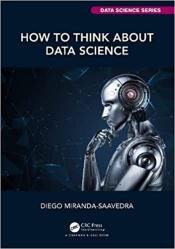How to Think about Data Science
- Добавил: literator
- Дата: 9-12-2022, 10:54
- Комментариев: 0
 Название: How to Think about Data Science
Название: How to Think about Data ScienceАвтор: Diego Miranda-Saavedra
Издательство: CRC Press
Серия: Data Science Series
Год: 2023
Страниц: 300
Язык: английский
Формат: pdf (true)
Размер: 147.8 MB
This book is a timely and critical introduction for those interested in what Data Science is (and isn’t), and how it should be applied. The language is conversational and the content is accessible for readers without a quantitative or computational background; but, at the same time, it is also a practical overview of the field for the more technical readers. The overarching goal is to demystify the field and teach the reader how to develop an analytical mindset instead of following recipes. The book takes the scientist’s approach of focusing on asking the right question at every step as this is the single most important factor contributing to the success of a data science project. Upon finishing this book, the reader should be asking more questions than I have answered. This book is, therefore, a practising scientist’s approach to explaining Data Science through questions and examples.
This book is accessible to readers without a strong computational background (although you should be numerically literate), but it is also of much interest to data science practitioners. For example, a programmer in a start-up who wears many different hats might benefit from reading the chapter on algorithmic bias (Chapter 5) or the chapter on cybersecurity (Chapter 6). Likewise, a regulator working on data privacy will benefit from having a critical understanding of the different types of supervised learning methods, their limitations and areas of applicability (Chapter 3).
Artificial Neural Networks (ANNs) are a class of supervised learning algorithms used both for classification and regression problems; in both cases the input may be numerical or categorical, and the output may only be categorical (classification) or numerical (regression). The role of an ANN is to take a series of inputs and outputs and derive a function that maps the two. That is, ANNs are function approximators.
Who is this book for?
This book is an introduction for anyone wishing to develop a critical understanding of Data Science. Data Science is a young and vast field at the intersection of many different disciplines, including programming, calculus and statistics, cloud computing, visualisation and storytelling, law, and privacy and security. As a result, data science is no longer the exclusive domain of computer scientists and engineers. Many other professionals such as regulators, lawyers, sociologists, mathematicians, hospital administrators and security experts enter data science and often make very valuable contributions thanks to their unique perspectives and backgrounds.
One warning, though: this book will not teach you any programming or includes any code. There are already plenty of books out there detailing algorithms and their implementation in the languages of data science (R and Python mostly), but these are ‘how to’ books. What we are trying to learn here is the why behind the problems in data science. We achieve this by discussing key concepts while abstracting away from the minutiae of the implementation. After all, data science consists of many straightforward ideas that are combined in multiple ways. Therefore, developing a holistic understanding is a most valuable skill that will survive specific programming fashions, working styles and computing platforms.
Скачать How to Think about Data Science
Внимание
Уважаемый посетитель, Вы зашли на сайт как незарегистрированный пользователь.
Мы рекомендуем Вам зарегистрироваться либо войти на сайт под своим именем.
Уважаемый посетитель, Вы зашли на сайт как незарегистрированный пользователь.
Мы рекомендуем Вам зарегистрироваться либо войти на сайт под своим именем.
Информация
Посетители, находящиеся в группе Гости, не могут оставлять комментарии к данной публикации.
Посетители, находящиеся в группе Гости, не могут оставлять комментарии к данной публикации.
